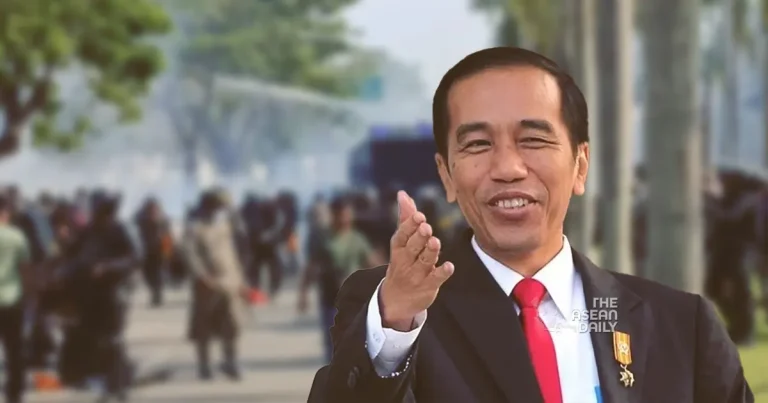15-9-2023 (KUALA LUMPUR) President Joko Widodo, popularly known as Jokowi, has addressed the local opposition surrounding the development of a new eco-city project on Rempang Island, located in Riau Islands. He described the issue as a case of miscommunication and assured that Investment Minister Bahlil Lahadalia would be sent to resolve the matter.
Over the past week, residents of Rempang have staged protests against the proposed development plan. The ambitious national strategic project aims to transform the 17,000-hectare island into an economic zone, attracting an estimated investment of US$11.5 billion. However, the project also involves the forced eviction of hundreds of families residing on the island.
Local demonstrators have resorted to felling trees, burning tires, and engaging in acts of violence, including hurling stones and Molotov cocktails at the Batam, Rempang, and Galang (Balerang) Bridge. They also targeted the office of the Batam Free Trade Zone Authority (BP Batam), one of the project developers, in their protests.
Security forces have responded by deploying tear gas and water cannons to disperse the crowds, while also making arrests of individuals suspected of inciting the riots.
President Widodo, however, has attributed the unrest in Rempang to “poor communication.” He explained that the local families had previously agreed to compensation terms, which included a 500-square-meter plot of land and a 45-square-meter house to accommodate their relocation.
“But, due to poor communication, [the eco-city project] has suddenly become an issue,” stated President Widodo during a press conference on Tuesday. He further expressed his intention to send Investment Minister Bahlil to Rempang to engage in dialogue with the locals.
Minister Bahlil had previously met with Rempang residents in August, but the meeting reached a stalemate, as the government insisted on proceeding with the development project despite objections from the locals regarding the eviction plans.
The government argues that the individuals living on Rempang Island are illegal squatters, as the island has been leased since 2002. rights concerns have also arisen in this context. On Tuesday, the National Commission on Human Rights (Komnas HAM) facilitated a closed-door meeting between Rempang residents on one side and representatives from BP Batam, the Batam administration, and the local police on the other. Komnas HAM chairwoman Atnike Nova Sigiro called upon both parties to refrain from resorting to force and urged them to prioritize dialogue.
Meanwhile, the Indonesian Legal Aid Institute (YLBHI) has condemned the arrests of local residents and the use of force by security personnel during the recent demonstrations. The institute claimed that such incidents were part of a growing trend of state repression aimed at suppressing resistance to national strategic projects. In a statement released on Wednesday, the YLBHI drew parallels between the Rempang situation and the unrest in Wadas, Central Java, in 2022, noting that these projects often result in conflicts between the state and its people, despite their purported goal of improving public welfare.
The rising tensions in Rempang have also captured the attention of lawmakers. Members of the House of Representatives Commission XI, responsible for overseeing national development, questioned Muhammad Rudi, the head of BP Batam and also the mayor of Batam, during a meeting on Wednesday. Lawmakers probed into the Rempang riots, and Rudi suggested that external provocateurs were likely instigating the local community.
Rudi stated, “[The negotiation process earlier this year] went fine, but when we came back [to Rempang recently], there were a lot of provocateurs that made the locals think twice about the deal.” He further noted that most of these provocateurs were informal landlords who would not receive compensation in the eviction process.
Rudi denied allegations of civilian injuries during the demonstrations and emphasized that completing the eviction process by the end of the month was crucial for BP Batam to avoid the risk of investors withdrawing from the eco-city project.
It is worth mentioning that in July, Indonesia signed a memorandum of understanding (MoU) with Chinese glass manufacturers Xinyi Group to establish the world’s second-largest glass factory on Rempang Island. This move aligns with President Jokowi’s focus on downstreaming, as it enables Indonesia to produce its own glass instead of relying solely on exporting raw quartz. Observers have drawn parallels between the Rempang eco-city project and other Chinese-backed industries across the country, which have often faced opposition from local communities.
One notable incident occurred in January when a labor strike turned violent at a Chinese-operated nickel-smelting factory in Central Sulawesi’s North Morowali regency, resulting in the deaths of at least two workers, including a Chinese national.
Discrimination against Chinese workers and concerns about job displacement among locals have also been prevalent during the early stages of the Covid19 pandemic. Many Chinese workers were denied entry into the country, with claims that they might bring the virus from China, where it was believed to have originated.




